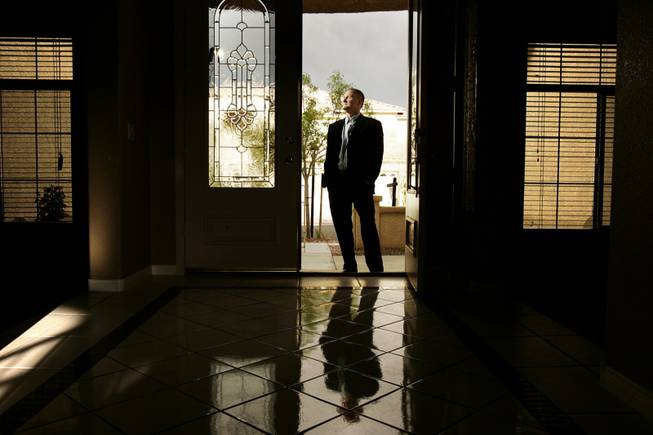
Real estate investor Mike Lathigee, shown Wednesday in front of a home he bought near Durango Drive and U.S. 95, says investors are often criticized for making money even though they are improving neighborhoods by fixing up and renting homes that would otherwise sit vacant.
Thursday, April 1, 2010 | 2 a.m.
Sun topics
Sun archives
- Report: After increase, home prices dropped in January (3-30-2010)
- North Las Vegas gets $677,700 to fight foreclosures (3-24-2010)
- February home foreclosures fall sharply in Nevada (3-10-2010)
- Las Vegas home sales dip for second month (3-9-2010)
- Cash deals make up half of Las Vegas home sales (2-24-2010)
- Bank-owned properties account for less than half of existing home sales (2-23-2010)
- Report: Las Vegas home prices up, breaking 39-month trend (2-23-2010)
- Nevada starts new year with same ranking: No. 1 in foreclosures (2-10-2010)
Investors are increasing their share of the Las Vegas Valley housing market, renewing the debate about whether that’s good or bad news.
Absentee buyers — primarily investors and some second-home buyers from out of state — purchased 45 percent of homes sold in Las Vegas in February, up from 43 percent in January, according to Andrew LePage, spokesman for San Diego-based MDA DataQuick.
Investors were blamed for the artificial inflation of housing values a few years ago. The median house price rose from $164,000 in 2003 to $275,000 in 2005.
Prices have remained fairly stable over the past year with Las Vegas-based SalesTraq pegging the median price at $119,000 through the first two months of 2010.
Housing analysts maintain that this wave of investors is more savvy. They’re more interested in buying the houses to rent them out rather than “flipping” them, that is, selling them quickly for a higher price.
Few of the current crop of investors will overpay for houses — as evidenced by the median price of their purchases in February, $104,000.
Speculators during the housing boom kept bumping up prices in part because they were flipping the houses — until the bubble collapsed on them and just about every other homeowner in Southern Nevada.
Home values have plummeted so that 70 percent of valley homeowners owe more on their homes than those properties are worth.
Housing analysts argue that the investors of 2010 are helping those homeowners by gobbling up the oversupply of homes for sale. In September 2007, the valley had 27,417 homes for sale. Last month, the total was 10,298.
If the excess inventory had lingered or grown, home values would have declined more, to the detriment of existing homeowners and local governments that need higher property values to bring in more property tax revenue.
Not only are investors “buying up the inventory, they also are providing houses at affordable rents,” said Dennis Smith, president of Home Builders Research. “There haven’t been that many apartments built. The investors who are renting out homes are satisfying a niche.”
Many families who lost homes to foreclosure don’t want to move into an apartment because they aren’t large enough, Smith said. They are paying $1,100 to $1,300 a month in rent instead of mortgage payments of $1,800 to $2,500 in many cases, he said.
“Where would they go if they didn’t have houses to rent?” Smith said.
Conventional wisdom is that a neighborhood full of rental houses will hurt property values because those people don’t have any significant, long-term investment in those homes.
In some cases that may be true, Smith said, but property values also suffer when homes sit vacant, so it can often be much better to have renters living in homes.
“Yes, we see a lot of investors coming in, but that is a good thing because we are selling homes and those units aren’t empty,” said Steve Bottfeld, executive vice president of Marketing Solutions. “When you put someone in one, that makes the neighborhood better. That factor is always overlooked.”
And many renters today are former homeowners, he added. Once they get their credit scores back up and improve their finances, they will be buying a home again.
Investors are proving to be a problem for first-time homebuyers, who are trying to get a deal on foreclosure properties. The investors often win out because they are able to pay cash. All-cash deals comprised 52 percent of home sales in February, LePage said. That advantage is a reason why the general public might cuss investors.
Motivated buyers, however, don’t give up and eventually find their home, Smith said. In some cases, their inability to find an existing home has prompted some to look to new homes whose prices decline more as builders seek entry-level homeowners.
Investors, meanwhile, are fixing up the homes they buy and eventually plan to sell them when the market rebounds and renters are in a position to get loans, Smith said.
That is starting to happen, based on the statistics. Flipping homes had been trending higher in recent months, LePage said. In February, 3.7 percent of homes sold had been sold three weeks to six months earlier. Five percent were flipped in January, he said.
“The positives are this inventory gets taken out of the foreclosure market, and it gets sold and people living in those houses are paying homeowner association fees and the community can continue paying for its services,” said Mike Lathigee, a Las Vegas investor who has bought more than 100 homes and condominiums. He has rented some and sold others.
He said he and his fellow investors don’t get enough credit for turning around neighborhoods by fixing up homes and condos.
“We get criticized for making money, but we are doing a great service.”

Join the Discussion:
Check this out for a full explanation of our conversion to the LiveFyre commenting system and instructions on how to sign up for an account.
Full comments policy